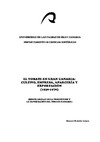Please use this identifier to cite or link to this item:
https://accedacris.ulpgc.es/jspui/handle/10553/9809
| Title: | El tomate en Gran Canaria: cultivo, empresa, aparcería y exportación (1930-1970): singularidad en la producción y exportación del tomate canario | Authors: | Rebollo López, Manuel | Director: | Santana Pérez, Germán Suárez Bosa, Miguel |
UNESCO Clasification: | 531201 Agricultura, silvicultura, pesca 531211 Comercio |
Keywords: | Cultivos | Issue Date: | 2012 | Abstract: | En este trabajo se pretende aportar una visión global sobre la historia del cultivo y la exportación del tomate en Gran Canaria. La singularidad de los regímenes de cultivo, el funcionamiento de los cosecheros y las peculiaridades de la exportación, se presentan con una señal de identidad que les distingue del resto del Estado. En este contexto, el trabajador se unía al cosechero para rentabilizar una producción de resultados anuales inciertos. Durante el período estudiado, el aparcero compartía el riesgo con el propietario o poseedor de la tierra en un sistema de contratación semiautónomo, basado en un régimen de aparcería que no se adaptaba en su legalidad al cultivo del tomate. El Gobierno percibe esta situación y dicta una legislación específica para los cultivadores ?a la parte? en Las Palmas y posteriormente en Santa Cruz de Tenerife, modificando gradualmente la personalidad jurídica del aparcero, que obtiene los derechos del trabajador a partir de 1970. La organización de la empresa se extrapola desde lo particular a lo general, donde se examina un panorama corriente del negocio y sus características. El cosechero-exportador asume la dirección, producción y comercialización de manera autónoma, menospreciando hasta hace muy pocos años el cooperativismo. This piece of work aims to provide a global view of the history of cultivation and export of tomatoes in Gran Canaria. The singularity of cultivation, the operation of harvesters and peculiarities of export, are presented with a sign of identity that distinguishes it from the rest of Spain. In this context, the employee joined the harvester to make the most of an uncertain production of annual results. During the studied period, the sharecropper shared the risk with the owner of the land in a semi-self-employed system, based on a sharecropping which was not legally adapted to tomatoes cultivation. The Government realized about this situation and issued a specific legislation for this kind of harvesters in Gran Canaria and then in Tenerife, gradually changing the legal status of the sharecropper, who gets rights as worker from 1970. The organization of the company is extrapolated from the particular view to the general one, which provides an overview of the business and its characteristics. The exporting harvester assumes the management, production and marketing in an autonomous way and scorns cooperativism until few years ago |
Description: | Programa de Doctorado: Historiografía, fuentes y métodos de la investigación históricas | Department: | Ciencias Históricas | Faculty: | Facultad de Geografía e Historia | URI: | https://accedacris.ulpgc.es/handle/10553/9809 | Rights: | by-nc-nd |
| Appears in Collections: | Tesis doctoral |
Items in accedaCRIS are protected by copyright, with all rights reserved, unless otherwise indicated.
